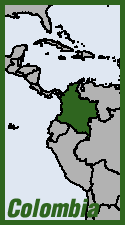 At least 18 FARC fighters were killed May 22 in an air-strike on a camp near the coastal village of Guapi in Colombia's southwest region of Cauca. The strike came little more than a month after President Juan Manuel Santos ended a suspension of aerial bombing in response to a guerilla attack that killed 11 soldiers. The army said the aim of the air-strike was intended to kill "Javier el Chugo," second-in-command of the FARC’s 29th front, although it wasn't immediately clear if he was among the dead. (Colombia Reports, May 22) The FARC responded to the strike by announcing suspension of its own unilateral ceasefire, first declared in December. A statement from the FARC command said: "We did not seek the suspension of the unilateral and indefinite ceasefire proclaimed on Dec. 20, 2014 as a humanitarian gesture to de-escalate the conflict, but the incoherence of the Santos government has done it, through 5 months of ground and air offensives against our structures throughout the country." (Colombia Reports, May 20)
At least 18 FARC fighters were killed May 22 in an air-strike on a camp near the coastal village of Guapi in Colombia's southwest region of Cauca. The strike came little more than a month after President Juan Manuel Santos ended a suspension of aerial bombing in response to a guerilla attack that killed 11 soldiers. The army said the aim of the air-strike was intended to kill "Javier el Chugo," second-in-command of the FARC’s 29th front, although it wasn't immediately clear if he was among the dead. (Colombia Reports, May 22) The FARC responded to the strike by announcing suspension of its own unilateral ceasefire, first declared in December. A statement from the FARC command said: "We did not seek the suspension of the unilateral and indefinite ceasefire proclaimed on Dec. 20, 2014 as a humanitarian gesture to de-escalate the conflict, but the incoherence of the Santos government has done it, through 5 months of ground and air offensives against our structures throughout the country." (Colombia Reports, May 20)
While Colombia's left opposition protested the air-strike and called for a bilateral ceasefire, the right-wing opposition applauded the strike and called for a stepped up war. Óscar Zuluaga, president of the right-opposition Democratic Center, called the FARC truce a "farce," claiming: "The FARC never, never have respected the truce, but rather have continuously killed soldiers and extorted Colombians." (CR, May 22)
Before the fateful air-strike, things seemed to be going in the right direction in Colombia. The US ambassador to Colombia, Kevin Whitaker, said May 11 that he accepted Bogotá's decision to suspend the longstanding Washington-backed program of spraying glyphosate herbicide to wipe out coca crops. Santos took the decision to halt the program on the recommendation of his Health Minister Alejandro Gaviria following international studies finding that glyphostae is a carcinogen. Whitaker tried to put a good face on it, admitting the decision "is Colombia's to make," but adding: "Colombia and the United States have developed a number of approaches as part of a comprehensive effort to confront narcotrafficking." Not that they've been particularly effective. Recent figures from the White House Office of National Drug Control Policy showed Colombian coca cultivation in 2014 grew to 280,000 acres, up 40% from the previous year. US officials blamed the jump on cultivation moving into restricted areas such as indigenous reservations and national parks. (LAT, May 11)
And days before the air-strike, Santos announced a cabinet reshuffle that heartened peace advocates. Defense Minister Juan Carlos Pinzón was named as ambassador to the US. Meanwhile, the sitting ambassador in Washington, Luis Carlos Villegas, was to become the new defense minister. Pinzón had become the public face of the Colombian state's war against the FARC, and the switcheroo was seen as a sign that war was winding down. (Colombia Reports, May 20)
In a development that will hearten Colombia's hardliners and Washington alike, one day before the Cauca air-strike, a small plane from Venezuela with more than a ton of cocaine on board crashed into the Caribbean while being chased by Bogotá's air force. The military said fighter jets intercepted the Hawker 800 after it entered Colombian air space. While attempting to escape, it crashed off the coast of Puerto Colombia, Atlántico region. Colombia's coast guard said the body of the pilot, whose nationality was unknown, was found among the wreckage along with 1.2 metric tons of cocaine. The incident will vindicate Washington's claim that Venezuela has become a key cocaine transit country—as well as providing a small success in ongoing "drug war" cooperation with Bogotá. (AP, May 21)
Cross-post to High Times







Recent comments
3 weeks 7 hours ago
3 weeks 13 hours ago
6 weeks 1 day ago
7 weeks 13 hours ago
11 weeks 20 hours ago
14 weeks 6 days ago
18 weeks 6 days ago
19 weeks 4 days ago
29 weeks 4 days ago
33 weeks 5 days ago